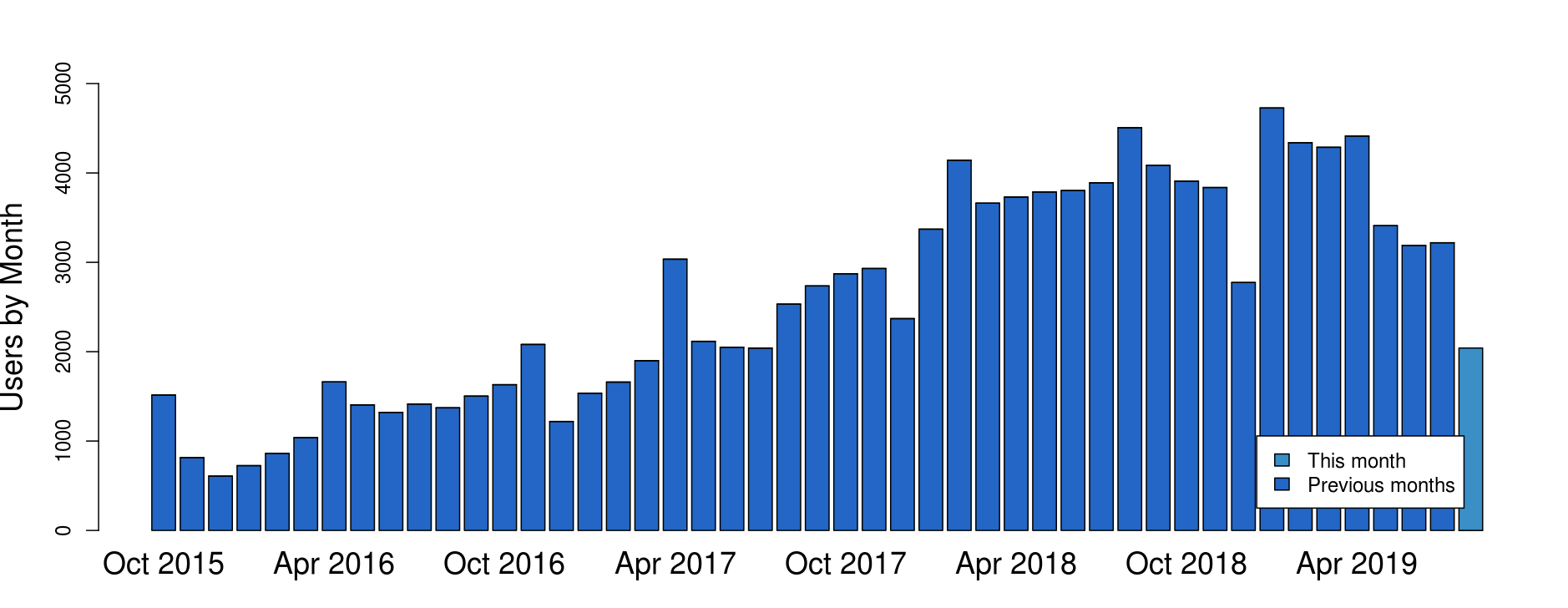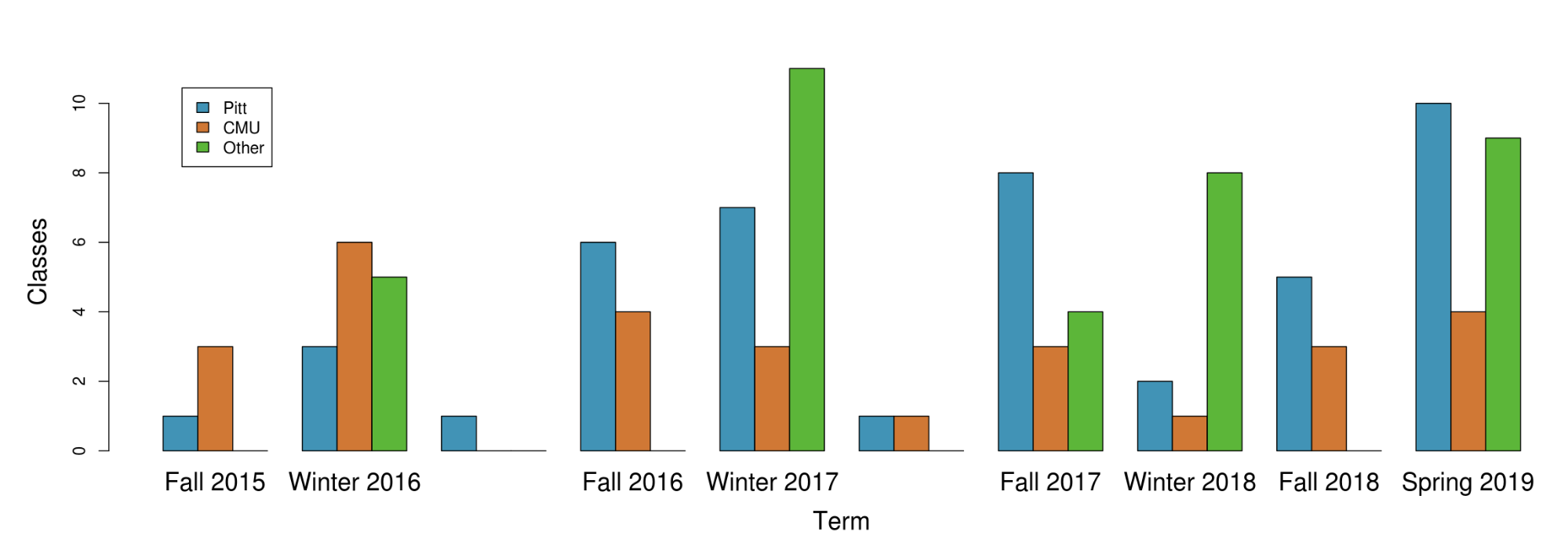Pittsburgh, PA: How open data has become a backbone of the civic-tech ecosystem
An application of our community-engagement impact framework
The Western Pennsylvania Regional Data Center, which is managed by the University of Pittsburgh in partnership with the City of Pittsburgh and Allegheny County, sees community engagement as an essential component of its work. As a data intermediary, WPRDC manages open data on behalf of the city, county, and other partners, while also helping people “find and use information to improve their communities.”
Bob Gradeck, the Project Director of WPRDC, says that despite having a small team, they still dedicate a decent amount of time doing outreach, having meetings with partners, and hosting office hours. According to Gradeck, there’s really no better way of learning about how communities are using their data unless they’re out there, engaging with users.
We applied our community engagement impact framework to summarize and assess the potential outcomes and impacts of WPRDC’s engagement work, which they already carefully track with the performance metrics dashboard.
1. Inputs
High-quality, easily accessible open data
- WPRDC Open Data has 324 datasets available
Resources and tutorials available for users with varying degrees of data skills
- Guides and tutorials available for beginning users of Open Data
- So You Want to Use Open Data: An introduction to the open data portal
- Using ArcGIS Online and Open Data: On making maps with open data
- Beginner FAQs
- Data User Guides: User-friendly guides to some of WPRDC’s most popular datasets
- Data 101 Toolkit
- Guides and tutorials for advanced users of Open Data
- CKAN API documentation for the open data portal
- Using Tableau Public to Analyze Open Data: How to use the OData connector with Tableau to make powerful data visualizations
- Data Wizards FAQs
Opportunities for users to engage with the open data portal
- Data request page allows users to submit requests for data not published in the WPRDC platform
- WPRDC encourages users to contact them with any questions about using open data
- Users can explore and add code to WPRDC’s GitHub repositories and submit pull requests
- Users can add tools they’ve created with open data to WPRDC’s list of relevant tools and analyses on Github
2. Activities
Host or participate in community meetings about open data to share information and solicit input from community members
- WPRDC hosts monthly or bimothly office hours, an opportunity for users “to ask in-depth questions about how to use and apply data, discuss project ideas, get help with software and other tools, and explore points of confusion or interest that cannot be fully addressed by the website”
Host or partner with in-person or online trainings or workshops around using open data
- WPRDC works with local civic tech groups and libraries to participate in and/or promote technical trainings and data workshops
- Carnegie Library’s Excel basics workshops
- Carnegie Library’s Python workshops
- Code for Pittsburgh’s bi-weekly work nights
- Pittsburgh’s annual Inclusive Innovation Summit
Launch partnerships with local journalists, academics, community organizations, and civic-tech groups
- WPRDC is managed by the University of Pittsburgh Center for Urban and Social Research in partnership with Allegheny County and the City of Pittsburgh
- WPRDC is a partner of the National Neighborhood Indicators Partnership (NNIP)
- WPRDC regularly partners with local civic-tech organizations such as Code for Pittsburgh
- WPRDC staff work with academics and educators using open data in their research or classrooms to learn about the different uses of their open data
- WPRDC worked with Carnegie Library of Pittsburgh to develop a Data 101 workshop series and a toolkit to guide others hosting these events
Showcase stories and tools built with open data (by WPRDC, local government, and community partners)
- WPRDC Tools feature projects and services that have been developed using WPRDC hosted data
Distribute newsletters or blog posts sharing open data updates
- WPRDC publishes open data news and updates
- Open Date & Civic Tech News Newsletter
Share updates, respond to users, promote open data, and solicit feedback on social media
- WPRDC on Twitter
3. Outputs
Number of users

(image via WPRDC’s performance management dashboard)
Classroom uses of open data
- WPRDC tracks known uses of their data at local universities by term:

(image via WPRDC’s performance management dashboard)
News articles referencing WPRDC in 2018–2019:
- 6 articles, including:
- City releases energy benchmarking report of facilities (South Pittsburgh Reporter)
- Finding a spot may get a little easier — you now can access all of the city’s parking data (Pittsburgh Post-Gazette)
- During five years in office, has Mayor Peduto fulfilled his pledges to Pittsburgh? (Public Source)
- What’s New in Civic Tech (Government Technology)
- Pennsylvania’s Code4PA Event Expands, Taking on the Opioid Crisis (Government Technology)
- 5 ways Pittsburgh’s public servants are using human-centered design (Technical.ly)
News articles citing WPRDC datasets as source:
- 7 articles, including:
- Allegheny County representatives call for statewide indoor smoking ban for workplaces (Pittsburgh City Paper)
- These are the Allegheny County bars and businesses where you can smoke inside — for now (The Incline)
- Did 80% of Pittsburgh really vote for Hillary Clinton? (Politifact Pennsylvania)
- The Pittsburgh Area Really Did Vote for Trump (CityLab)
- Pittsburgh’s Healthy Ride not so healthy, but changes are on the way (Pittsburgh Post-Gazette)
- The meteoric rise of the ‘oodle’ — and other cross-breed dogs (Pittsburgh Post-Gazette)
- Where you live can determine how long you live — and here’s why (Pittsburgh Post-Gazette)
Research articles citing WPRDC open data as a source
- 13 recent articles, some of which include:
- Physical environment and violence perpetration among male youth in Pittsburgh: a spatial analysis (Allegheny County Tobacco Vendors, On-road Bicycle Pavement Markings)
- Implementing smoke-free laws in the context of the tobacco retail environment in Allegheny county: a geospatial analysis (Allegheny County Private Schools Locations)
- Perceptions and expectations of autonomous vehicles – A snapshot of vulnerable road user opinion (Autonomous Vehicle Survey of Bicyclists and Pedestrians in Pittsburgh)
- Mapping Pittsburgh’s Lead Problem (Allegheny County Property Assessments)
- Travel Characteristics-Based Parking Demand Models for Institutional Urban Areas (Allegheny County Building Footprint Locations)
- Collective action models for chronic disease prevention: an evaluation of live well Allegheny (Allegheny County Obesity Rates, Allegheny County Smoking Rates)
- A Data-Driven Approach for Assessing Biking Safety in Cities (Allegheny County Crash Data)
- How Geotagged Social Media Can Inform Modern Travelers (Neighborhood Boundaries)
Data stories or tools developed by individual residents or community organizations
- WPRDC Tools showcase products such as:
- 8 tools developed by WPRDC
- 4 by Allegheny County
- 6 bycommunity members/partners
- 1 by the City of Pittsburgh
4/5. Outcomes and Impacts
An obvious outcome from WPRDC’s engagement work is the fact that they have a strong sense of who is using their data and why. Having this understanding allows them to continually assess the longer term influence they have on the individuals and organizations using their data, and this in turn helps them evaluate their impact.
As noted in our explanation of this framework, outcomes and impacts can be very difficult to quantify. We do not have available a list of precise measures of outcomes and impacts for this Pittsburgh/WPRDC example — but we hope that the content above still gives a sense of how this framework might be applied. To see more potential outcomes and impacts of this type of work, take a look at our Louisville application of this framework.

